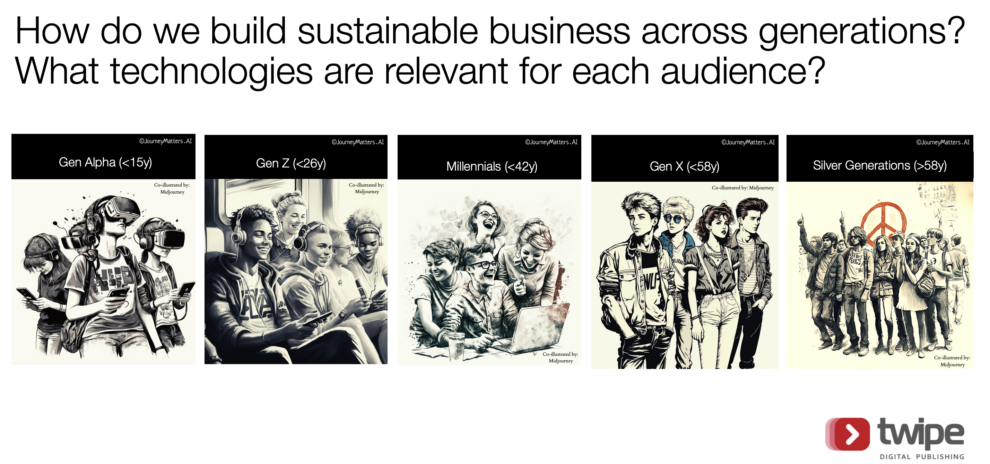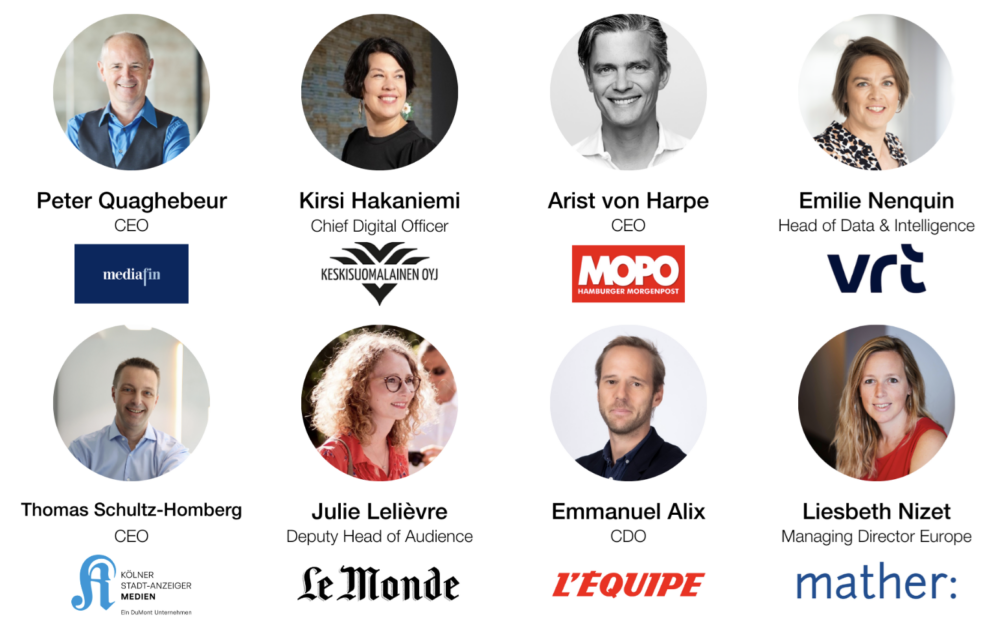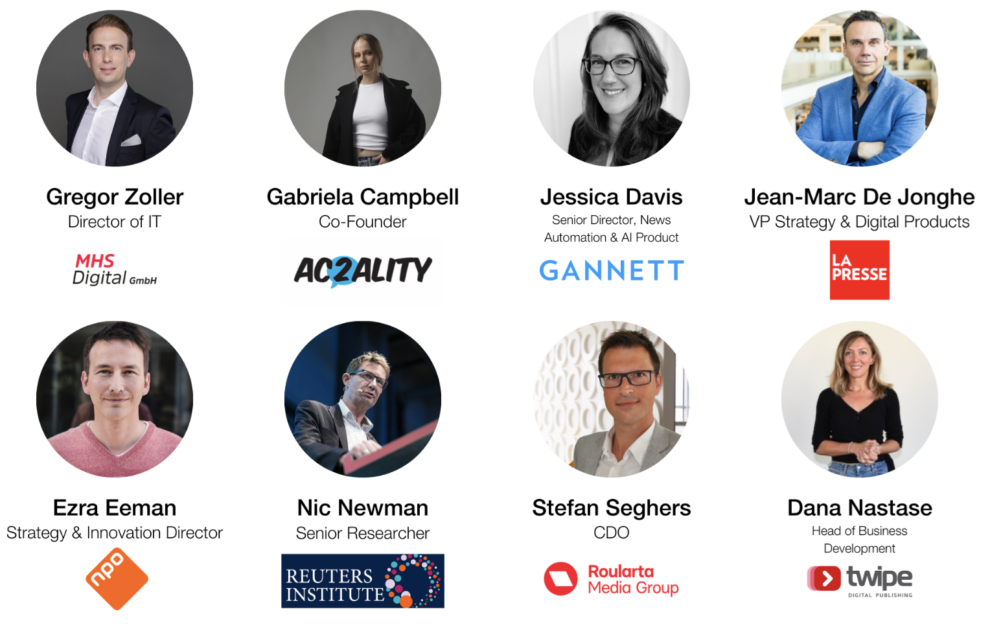Blog
AI, Mobile apps, Multi Channel Publishing: technologies driving growth according to 5 news media leaders

This week we invited leaders from news organisations in the UK, Germany, France, Belgium and the Netherlands to join us in Leuven to discuss strategy, products and the future of news.
During the workshop, we asked leaders from Mediahuis, Le Monde, Kölner Stadt-Anzeiger, and The Telegraph which technologies are crucial to business growth in the next coming years. We also tackled the complex topics of cross-generation engagement which will be further addressed in this year’s Digital Growth Summit (tickets still available, register here).
We asked a couple of questions to learn more about their professional opinions regarding the news industry, and where it is heading. Starting with the first question:
‘What technologies are crucial for business growth in the next 3 to 5 years?’
To have a better understanding of the industry’s landscape, knowing what technologies are prevalent within the space is certainly important. This question also provides an understanding of the industry’s trajectory and what to keep an eye out for.
During the interviews, we received many similar answers. Most of the responses were, not surprisingly, about Artificial Intelligence or AI. This technology has recently taken the world by storm, a development spearheaded by the release of OpenAI’s ChatGPT back in November 2022.
Artificial Intelligence
CEO at Kölner Stadt-Anzeiger, Thomas Schultz-Homberg strongly believes there will be “advanced AI in the next 3-5 years”, adding that “generative AI will play an important role”. Director of Product at The Telegraph, Mathias Douchet added that machine learning, a subsection of AI, is also another technology that will gain more widespread presence within the industry.
🤖 A definition of machine learning describes it as ‘a branch of artificial intelligence (AI) and computer science which focuses on the use of data and algorithms to imitate the way that humans learn, gradually improving its accuracy’.
Clearly the trajectory of the industry, at least in the technology department, is utilising AI to perform tasks that can be automated, which helps to free up brainpower for more uniquely human-exclusive creative tasks. Additionally, Schultz mentioned “technology that fosters automation” will also gain significance as that will help with reducing cost, especially in an industry susceptible to declining revenues.
Multichannel Publishing
CTO at Le Monde, Sacha Morard, touched upon the topic of “multichannel publishing technologies”, to add his support to the notion that automation is something to pay attention to. A bottleneck that automation can alleviate would be reducing the need to adapt a piece of content to accommodate all the different platforms’ formats. There are definitely advancements being made towards this reality especially with the advent of Generative AI. Our team at Twipe is already exploring this topic this summer – stay tuned as we will share its results later this year in our newsletter.
Mobile Apps
Another technology that got mentioned was mobile apps. Deputy Chief Product Officer at Le Monde, Quentin Leredde, alongside Douchet told us the importance of mobile technologies in the future of news, partly due to the changing ways of news consumption. Indeed, in the words of Chief Digital Officer at Mediahuis, Han-Menno Depeweg, publishers need to follow their subscribers and the technologies their readers are using, and to be “technology agnostic”.
The widely referenced digital report by Reuters showed one of the key takeaways is ‘the war in Ukraine and the Coronavirus pandemic, have accelerated structural shifts towards more digital, mobile, and platform-dominated media environments’.
💡 Only around a fifth of respondents (22%) now say they prefer to start their news journeys with a website or app – that’s down 10 percentage points since 2018 – Reuters Digital News Report
Our solution – EngageReaders, certainly can be a recourse for this challenge. The technology helps to identify well-performing articles to aid in increasing reader engagement. This introduces a number of benefits which includes churn reduction, raising subscriber loyalty, performance prediction, and overall creating better digital news experiences.
Then we went onto the second question:
‘Which generation keeps you awake at night, and why?’
We asked this question because it is a well-established fact within the industry that news consumption significantly differs from generation to generation. However this is not an attempt at singling out any one of the generations as more important, but there are of course key differences that make them more unique than the other.

But unlike the first question we asked, this question actually received different answers. Depeweg said that it is the last generation, sometimes called the ‘Silver generation’, that keeps him up at night. He believes that by putting in preventive measures to keep them from churning, it may prove to be a profitable decision. Shultz-Homberg and Lerrede also maintain on the same page, that the so-called “print subscribers” generate the most revenue which the publishers can leverage to build towards a digital future.
🇧🇪 Learn more about the future of news and engaging different generations at the upcoming Digital Growth Summit on 26th September in Brussels. Limited tickets are still available.
On the other hand, the younger generations starting from the millennials, received some recognition from the guests. It is noted that these younger generations have developed different behaviours when consuming news that needs to be adapted to in order to capture their attention.
However, a concern expressed by Leredde is the method of monetisation of these generations. As there is supporting evidence showing they do not stick to the traditional way of accessing news, of which an alternative approach needs to be constructed. It is a challenge faced by many players within the industry that requires more time and research to develop a holistic understanding of these generations.
Join the Digital Growth Summit
On September 26th news media leaders will gather in Brussels, Belgium to discuss technologies shaping the future of news at the 6th edition of the Twipe Digital Growth Summit.
The summit boasts a lineup of renowned industry speakers sharing cases and insights, and futurist & author Peter Hinssen as keynote speaker. Drawing on his expertise, Peter will talk about ‘Navigating the Never Normal in News’.
Join us in Brussels for an exclusive day or learning, inspiration and connect with industry colleagues. Reserve your spot today whilst tickets are still available!
Discover our speakers


Other Blog Posts

Stay on top of the game
Subscribe to Twipe’s weekly newsletter to receive industry insights, case studies, and event invitations.
"(Required)" indicates required fields
